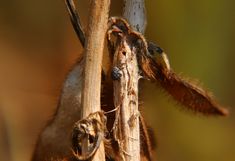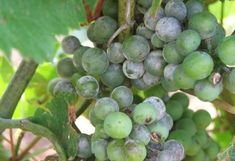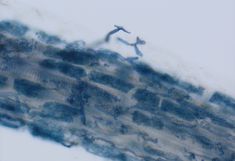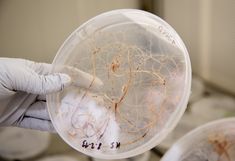Plant-pathogen-interactions ~ Climate change ~ Biological control ~ Agrobiodiversity ~ Use-of-potential & Risk analysis
Phytopathology and plant protection
Keeping crops healthy is an enormous challenge for agriculture and horticulture throughout the common society. Beside ensuring them as human food and animal feed as well as natural resources for industry, the aspect of climate- and environment-protection is gaining continuously more importance.
We carry out basic research including the potential of intermediate crops and alternative soil-amendments such as compost and Biochar to reduce or eliminate plant pathogenes. Furthermore, we analyse the function of root exudates in the plant-pathogen interaction using the model system Fusarium oxysporum f.sp. lycopersici and tomato as well as Sclerotinia sclerotiorum and soybean. Based on our results we develop new and sustainable methods to control plant diseases.
Moreover, we work on solutions related to current problems in plant protection concerning biological and integrated crop-, vegetable- and ornamental plant production as well as viticulture and pomology.
contact: Univ. Prof. DI Dr. Siegrid Steinkellner (location Vienna and UFT)
Plant protection in viticulture
Aim of this research group is to develop new approaches enabling reduction of the pesticides usage by targeted pathogen control in both biological and integrated crop production. Prediction models for the most important pathogenes in viticulture are of fundamental importance.
The current focus of our research is put on powdery mildew on grapevine in particular on its biology. An important question is, which of the two infective strains in Austrian viticulture is more relevant. We investigate which strain is responsible for the primary infection. In this context, the assessment of local weather conditions in vineyards plays a major role.
The collected data shall be integrated in risk models in order to help wine-growers controlling powdery mildew more effectively.
Microbial interactions in the biological control of plant pathogens
Plant pathogens cause major losses in crop production every year due to quantitative and qualitative yield losses. Stricter laws in connection with the authorisation of chemical synthetic pesticides, the need to change active ingredients to avoid resistance to plant protection products and the increased demand for organically produced foodstuffs require new sustainable control strategies. In order to develop such sustainable strategies for the biological and integrated control of phytopathogens, the focus of this research area is on crop plants with their diverse interactions with pathogenic, symbiotic and antagonistic microorganisms. An interdisciplinary approach is pursued that includes both in-vitro and applied experiments. The current focus is on interactions of crop plants with arbuscular mycorrhiza and endophytic fungi from the genus Serendipitaand their effect on the development of soil-borne pathogens.
Molecular nematology
Plant-parasitic cyst and root-knot nematodes cause substantial crop losses in the agriculture worldwide, estimated annually at several billion Euros. Especially the cyst nematodes are a particular threat as their cysts are very durable and can remain viable for many years in the soil. The group “Molecular nematology” analyses the formation and further development of the feeding sites induced by cyst and root-knot nematodes within the host root. We investigate these processes with different methods of molecular biology. The obtained results significantly help to understand how the nematodes maintain their feeding sites and their nutrient supply. This knowledge can be used for the development of new crop varieties with increased tolerance or resistance towards plant-parasitic nematodes. Furthermore, we are interested in the interaction between the endophytic fungi and different crop plants and their impact on plant-parasitic nematodes. The group “Molecular nematology” analyses several members of the Sebacinales family known to significantly enhance plant growth, seed yield and the tolerance towards abiotic and biotic stress of a wide range of vascular plants. The results will significantly contribute to better understanding of the interaction between the beneficial root endophytes and plant-parasitic nematodes in crop roots as well as to the development of new environmentally friendly anti-nematode strategies in those crops.




